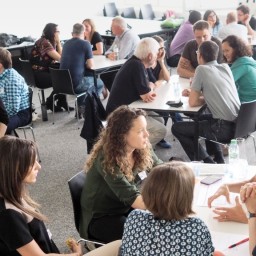
I have long argued, and repeated ad nauseam that in complexity we start journeys with a sense of direction we don’t try and achieve goals. We remain open to the evolutionary opportunities of the here and now, the present and the adjacent future states. | Dave Snowden Continue reading In Complexity We Start Journeys with a Sense of Direction Dave Snowden

Traditional change management often falters in complex, unpredictable environments. The Vector Theory of Change offers a resilient approach, emphasizing adaptable directions over fixed goals. This theory promotes continuous sensing, experimentation, and adaptation, allowing individuals and organizations to navigate change more effectively and thrive in uncertainty. Credit: This insight was inspired by Dave Snowden. Further Reading … Continue reading Set a Direction Rather Than a Specific Goal Change Insight

Writing with AI Isn’t Necessarily Cheating Protected: My Writing Process ## Close Pop-up all posts in this chapter What’s the Vibe? Please be patient as this may take up to a minute to load… Close Conversations shape how we understand and adapt to change. When dialogue is restricted by rigid goals or constrained by fixed … Continue reading The Vector of Great Conversations A parallel between the vector theory of change and conversational leadership

Protected: My Writing Process ## Diplomacy ## Close Pop-up all posts in this chapter What’s the Vibe? Please be patient as this may take up to a minute to load… Close Effective knowledge sharing is crucial for innovation and success in today’s world. However, many organizations struggle to nurture a culture of collaboration. Implementing Knowledge … Continue reading Nurturing a Collaborative Culture Through Knowledge Cafés Using Knowledge Cafés to bridge silos and encourage open dialogue

Traditional change management methods, with their rigid plans and fixed outcomes, often struggle in today’s complex, unpredictable environments. Dave Snowden’s Vector Theory of Change offers a more adaptable solution by focusing on setting a broad direction (vector) rather than a specific goal. Continue reading The Vector Theory of Change Navigating change in a complex world

In an unpredictable world, achieving complex goals through direct methods often fails. Traditional, rigid planning can fall apart under changing circumstances. Embracing obliquity—an indirect, adaptive approach—leads to success by allowing flexibility, learning from failures, and focusing on meaningful pursuits. Continue reading Obliquity in a Complex World In a complex world, goals are often best achieved indirectly

Large language models are changing how people write software. However, not all AI-assisted coding works the same way. Vibe coding offers a looser, more conversational approach—less about writing every line yourself, more about shaping what the AI gives you until it feels right. It’s a different kind of programming. Continue reading What Is Vibe Coding? Programming in the Age of AI







